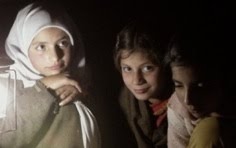 In early cultures the world over, the Storyteller had a place of true value. Before written language was used, historic, religious, and cultural knowledge was passed from generation to generation orally, and as the Keeper of all this collective knowledge, the storyteller was one of the most important people in the community.
In early cultures the world over, the Storyteller had a place of true value. Before written language was used, historic, religious, and cultural knowledge was passed from generation to generation orally, and as the Keeper of all this collective knowledge, the storyteller was one of the most important people in the community.This story from Kazakhstan, shows the value placed on storytelling and storytellers:
It was the seventh day. God had finished making the world. Tired, but happy, he suddenly realized he had forgotten to give human beings their brains. God was understandably upset! Calling some angels, he handed them jugs filled with this important ‘ingredient’ and said, "Go quickly, and make sure you give all humans their brains." The angels flew down to Earth and found that there were so many people, there was not enough brain-stuff in their jugs to go round! So they made sure they at least gave each one a little.
God looked down on creation and was really sad to see wars, poverty, hunger selfishness and tears. "I think I know why.” he declared, “These human beings have only got a bit of brain each." So God created a few extra people, this time making sure he filled their brains right up to the top. He filled those brains with sparkling words - stories, songs, poetry and music.
These were storytellers God sent down to Earth, to tell and sing wisdom into foolish human hearts.
While some stories can be deliberately told to perpetuate a narrow world view, most traditional stories can provides the ‘larger context’ within which we are invited to move beyond conflict. Conflict, we have been told, comes from a limited view that looks like you and I are separate. Story has the capacity to hold differing perspectives in the same story, and offer the wide-angle view that invites us to transcend our differences. Most significantly, even if it doesn't solve our differences; it creates something that's bigger than our differences.
In the power to tell a story lies the power to shape our reality, to alter our perceptions, to create new worlds of experience.
The best Tellers are those who also listen, because can come from many sources. In Stories From The Mountains and Beyond, the writer, Granny Sue reminds us:” … We must first hear stories from some source, whether it be another person, a book, our own inner voice, or the physical world around us. We need to be listening and aware to hear the stories being gifted to us daily … stories told with a glance, in a song, in children playing a game. Stories in the wind in the trees, birds calling, water trickling over rocks, the soft swish of snow falling, doors closing, windows opening, swing sets creaking, footsteps, the hum of air conditioners or crackle of fire, car horns, train whistles, elevators …” All these have stories for the teller willing to listen.
David Spangler in an article that discusses the relevance and importance of Telling today writes: “We are a storytelling, story-loving species. Let someone be spinning a good tale at a gathering and watch a crowd collect to listen … If, as St. John says, in the Beginning was the Word, then the Story followed directly after, unfolding the universe from the imagination of God. In emulation of the divine, we have sought to duplicate that moment of creation by being storytellers, too.”
Reading a story is wonderful, but being in the presence of a Teller who gifts you a story from her or his heart is a truly wondrous experience. A kind of ‘field’ is created between Teller and Listeners that creates a space to learn, change and grow.
Today, take time to honor the Tellers you know and have known, and the Teller within you too.
Marguerite Theophil
Wherever a story comes from, whether it is a familiar myth or a private memory,
the retelling exemplifies the making of a connection from one pattern to another:
a potential translation in which narrative becomes parable
and the once upon a time comes to stand for some renascent truth.
This approach applies to all the incidents of everyday life:
the phrase in the newspaper, the endearing or infuriating game of a toddler,
the misunderstanding at the office.
Our species thinks in metaphors and learns through stories.
~ Mary Catherine Bateson
